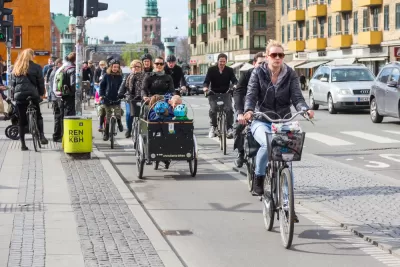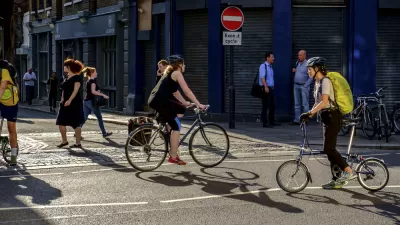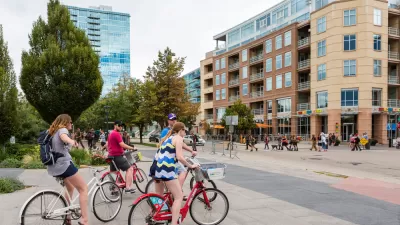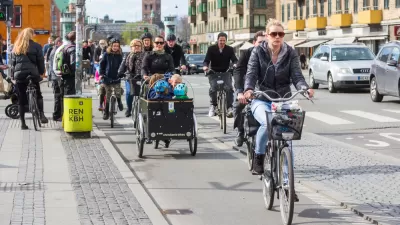Copenhagen may have already met its bicycling goal of 50 percent of modal share for commuting, but it needs to improve the share for all trips. With less funding available, the city is pursuing low cost strategies, such as auto parking removal.

"To improve air quality and reduce motor-traffic congestion, Copenhagen municipality’s 'Cyclist Priority Plan for 2017-2025'—Cykelstiprioriteringsplanen 2017-2025—aims to get even more people on bikes," writes Carlton Reid for Forbes. "The goal had been to increase bicycle commuting journeys to 50%, and this target looks set to be exceeded this year."
For the first time since the City starting counting traffic entering the city center, there are more bikes than cars,” wrote urbanist Mikael Colville-Andersen [founder of the Copenhagenize.com blog that highlights the cycling life in Copenhagen and around the world] in 2016.
“It is a clear indication that continuous municipal policy and investment in Best Practice infrastructure pays off,” he added.
Achieving half of all commute trips is a remarkable feat for the world's top bicycling city, but that's not the same as modal share for all trips, "which remains at 28 percent," adds Reid.
The car’s share of all trips increased from 31% to 32% between 2017 and 2018, an uncomfortable fact for the municipality which wants to reduce car use for all trips to 25% by 2025.
According to the city's 2019 bicycling statement, "[t]he bicycle is one of the most CO2-neutral modes of transport available, and continued investments in bicycle infrastructure and bicycle parking are central to achieving both traffic goals [and] climate goals." However, Reid notes that the budget for the Danish Road Directorate has been reduced, so less costly infrastructure investment is necessary.
Copenhagen is looking to reduce motor-traffic speeds through cheaper measures such as reducing car parking spaces and, instead, expanding parking spaces for cyclists, which is more space-efficient and ultimately more cost-effective.
If that approach sounds familiar, it's also being implemented successfully in Oslo and Amsterdam.
New metro lines open next month—will the cycling mode share drop?
One of the reasons for the increase in cycling during the past decade has been unintentional but welcomed by the bicycling community—construction of two new metro lines, M3 and M4 or City Circle and Harbour Lines, respectively, and collectively known as Cityringen, which will connect to the existing metro at the Kongens Nytorv and Frederiksberg stations.
"We don't like the Metro but damn, right now, we love the Metro construction," opined Mikael Colville-Andersen on July 2, 2104.
The City is following the traffic planning guide for liveable cities to the letter. Copenhagen has 17 Metro stations under construction and this is having a massive effect on mobility patterns in the city. Driving is a pain in the ass.
And the warning:
Mark my words, however. When the Metro construction is finished in 2018... probably 2019... we will see a sharp drop in cycling levels, back to the standard levels we plateaued with for the past few years. You read it here first.
Update on Oslo's auto parking removal
The Economist reports on May 30 that the same two urban blights of pollution and traffic congestion have compelled other European cities to implement plans to reduce motor vehicle traffic. Like Copenhagen is planning, Oslo has removed on-street auto parking, replaces the spaces with "benches, bicycle docks and more pavement."
While successful, the media, and drivers, don't always get it right.
Oslo’s plans have often been billed as a “car ban” by the press and driving enthusiasts. This overstates the magnitude of the changes. For one thing, the city’s new anti-car policies mainly affect only the compact city centre. Moreover, cars are hardly banned—walk through the streets of Oslo today and you will find there are still plenty zipping about.
And, like cities on this side of the pond, they have similar challenges, like dealing with the business community who resist the loss of parking spaces. Local politics, in the form of gains made by the Green Party, helped the controversial policy overcome the opposition.
Related in Planetizen:
-
Rather Than Banning Cars, Amsterdam Reduces On-Street Parking, April 11, 2019
-
In Oslo, Streets for People, Not Cars, December 25, 2018
- A Car Ban By Other Means, July 2, 2018
- Oslo's Car-Free Dreams Easier Said Than Done, June 17, 2017
-
TED Talk Pitches a Shift in Street Design: Mikael Colville-Andersen discusses the benefits and methods of designing bicycle infrastructure, Sept. 26, 2014
Hat tip to Gladwyn D'Souza.
FULL STORY: Copenhagen Plans Greater Restrictions On Car Use As Cycling Surges To 49% Of Commuter Journeys

Maui's Vacation Rental Debate Turns Ugly
Verbal attacks, misinformation campaigns and fistfights plague a high-stakes debate to convert thousands of vacation rentals into long-term housing.

Planetizen Federal Action Tracker
A weekly monitor of how Trump’s orders and actions are impacting planners and planning in America.

Chicago’s Ghost Rails
Just beneath the surface of the modern city lie the remnants of its expansive early 20th-century streetcar system.

Bend, Oregon Zoning Reforms Prioritize Small-Scale Housing
The city altered its zoning code to allow multi-family housing and eliminated parking mandates citywide.

Amtrak Cutting Jobs, Funding to High-Speed Rail
The agency plans to cut 10 percent of its workforce and has confirmed it will not fund new high-speed rail projects.

LA Denies Basic Services to Unhoused Residents
The city has repeatedly failed to respond to requests for trash pickup at encampment sites, and eliminated a program that provided mobile showers and toilets.
Urban Design for Planners 1: Software Tools
This six-course series explores essential urban design concepts using open source software and equips planners with the tools they need to participate fully in the urban design process.
Planning for Universal Design
Learn the tools for implementing Universal Design in planning regulations.
planning NEXT
Appalachian Highlands Housing Partners
Mpact (founded as Rail~Volution)
City of Camden Redevelopment Agency
City of Astoria
City of Portland
City of Laramie





























